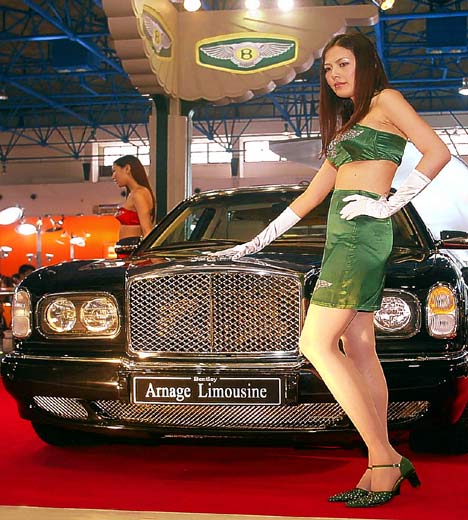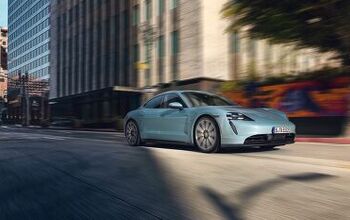China Saves Bacon Of Luxury Car Makers

It’s a strange world. Europeans are changing their already small cars for tiny ones. Manufacturers fall over themselves building ever smaller and cheaper cars. In the USA, small cars are suddenly big. Ford’s analyst George Pipas says that this year, small cars accounted for 21 percent of all U.S. vehicle sales. By 2013, Pipas predicts that compact cars, subcompact cars and crossover vehicles built off small car platforms will account for 36 percent of total new vehicle sales in the United States. Car executives that still have a job bemoan the times where big cars meant big profits.
A new frugality is rampant on the globe. Makers of luxo-barges, such as BMW and Mercedes are in big doo-doo.
Audi sales in China more than doubled to 16,503 cars in November. Audi thinks, China will pass Germany as its largest market within two or three years. In November, BMW sold 8,470 cars in the Middle Kingdom, up 40 percent.
BMW and Mercedes are moving more production to China. BMW is building a second plant with the Chinese joint venture partner Brilliance. Daimler also announced that they will triple their Chinese capacity.
Yale Zhang, a senior Shanghai-based analyst with U.S. consulting firm CSM Worldwide, said to the Wall Street Journal he expects China’s premium-car segment to grow 26 percent to 315,000 vehicles next year.

Bertel Schmitt comes back to journalism after taking a 35 year break in advertising and marketing. He ran and owned advertising agencies in Duesseldorf, Germany, and New York City. Volkswagen A.G. was Bertel's most important corporate account. Schmitt's advertising and marketing career touched many corners of the industry with a special focus on automotive products and services. Since 2004, he lives in Japan and China with his wife <a href="http://www.tomokoandbertel.com"> Tomoko </a>. Bertel Schmitt is a founding board member of the <a href="http://www.offshoresuperseries.com"> Offshore Super Series </a>, an American offshore powerboat racing organization. He is co-owner of the racing team Typhoon.
More by Bertel Schmitt
Comments
Join the conversation
-
 CRacK hEaD aLLeY
on Dec 16, 2009
CRacK hEaD aLLeY
on Dec 16, 2009
I read recently that MB sold 2.435 cars in Brazil between January and July this year. 1.673 were sold last year during the same period. So, yes, there is an increase but these numbers are, what, equivalent of how many cars were sold in Los Angeles alone in a couple of months? The luxury car market in Brazil is nothing compared to China. Bankers in São Paulo, artists and soccer players in Rio and politicians in Brasilia. And that's it except for a few soy and sugar cane farmers here and there. And they live in São Paulo anyway. MB has a factory in São José dos Campos in São Paulo. It's been there since the early 50's building all the MB trucks and buses you see everywhere. They own the truck chassis market & this is their bread & butter. THEN there is the fiasco few talk about, their plant in Juiz de Fora, near Rio. This semi-defunct plant is a reminder of the DaimlerChrysler Halcyon days. It is a three-shift factory with a capacity of 70K + cars/year, built in '99 to assemble the A class for sale in Brazil and the rest of the world. And sell it did not. I think they had visions of MB doing what VW did in the 50's with the bug in Brazil and Mexico. Who knows. The investment is probably a big blob or red ink in someone's excel spreadsheet in Germany but it is quite a sight when you drive from Rio to Belo Horizonte on the main highway BR-40. They keep the tall grass at bay, but ask any waiter at any of the myriad of local restaurants built to cater to the German hordes earlier in the decade and they will tell you business is dead and has been dead for years. For a while last year they built the C class CLC model on a CKD basis for export. Everything was shipped from Germany to Brazil... uncrated and assembled into a car and then left to cook on a open lot under the tropical sun and rain waiting for a car carrier to be taken to the port to be shipped back to...Germany. Weird way to build a German car for the European market if you ask me, but I'm no expert in logistics and costs. They must know better.
-
-
Latest Car Reviews
Read moreLatest Product Reviews
Read moreRecent Comments
- Jeff Self driving cars are not ready for prime time.
- Lichtronamo Watch as the non-us based automakers shift more production to Mexico in the future.
- 28-Cars-Later " Electrek recently dug around in Tesla’s online parts catalog and found that the windshield costs a whopping $1,900 to replace.To be fair, that’s around what a Mercedes S-Class or Rivian windshield costs, but the Tesla’s glass is unique because of its shape. It’s also worth noting that most insurance plans have glass replacement options that can make the repair a low- or zero-cost issue. "Now I understand why my insurance is so high despite no claims for years and about 7,500 annual miles between three cars.
- AMcA My theory is that that when the Big 3 gave away the store to the UAW in the last contract, there was a side deal in which the UAW promised to go after the non-organized transplant plants. Even the UAW understands that if the wage differential gets too high it's gonna kill the golden goose.
- MKizzy Why else does range matter? Because in the EV advocate's dream scenario of a post-ICE future, the average multi-car household will find itself with more EVs in their garages and driveways than places to plug them in or the capacity to charge then all at once without significant electrical upgrades. Unless each vehicle has enough range to allow for multiple days without plugging in, fighting over charging access in multi-EV households will be right up there with finances for causes of domestic strife.


































Ford GT RIP